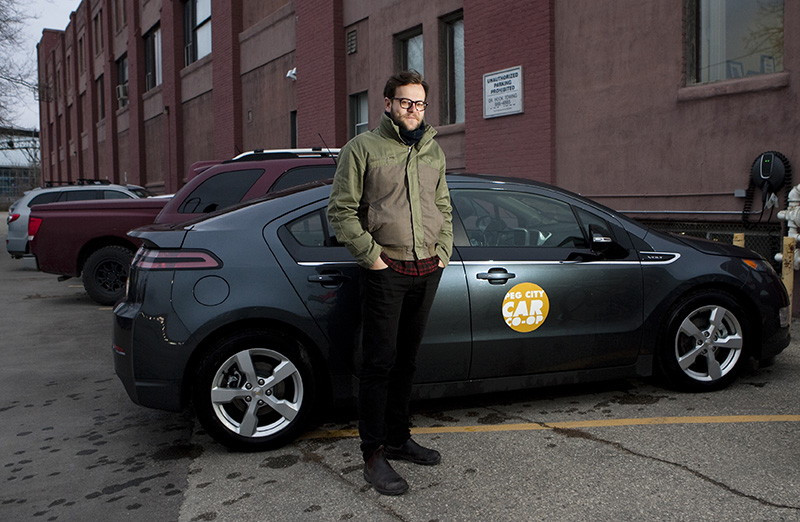Local ‘carsharing’ co-op nominated for national award
Critics debate usefulness and environmental impact of carshares
To some, the idea of sharing four cars between 120 people might sound like a special kind of hell.
Aaron Russin, membership coordinator for local carsharing group Peg City Car Co-op - whose slogan, “Bike. Walk. Bus. And sometimes, drive,” sums up its users’ transportation philosophy - says otherwise.
“Just think of it like community-owned transit,” said Russin.
For a $500 refundable membership fee, co-op members can book one of four cars in the co-op fleet, spread between South Osborne and the Legislature building.
Drivers are billed monthly based on a combination of their road time and mileage.
Founded in 2007, the local carsharing program, whose members have voting rights in the organization, was recently selected as one of six finalists from Western Canada in The Co-operators’ National Co-op Contest.
Russin, one of the organization’s two employees, says Peg City has a lot to offer those who don’t drive, but could stand to benefit from the ability to get behind the wheel every now and then.
“We’re really committed to providing an economical car alternative,” said Russin.
But how much sense does carsharing really make?
Stefan Dodds, an economics instructor at the University of Winnipeg, is guarded in his optimism.
“People who are thinking of joining up need to ask themselves, ‘How often am I going to be able to actually use one of the cars when I want to?’” Dodds said.
“To some extent, the success of (a carshare) depends on the density of its consumer base and whether or not they have a sufficient amount of vehicles to provide convenient access.”
According to Russin, the service as a whole experiences an average of about one booking per car, per day, with an average usage time of around three to four hours.
While he noted the 120-member co-op is looking to increase bookings at its existing locations in order to expand into other areas, Russin said the carshare’s current usage density leaves plenty of room for new members concerned about convenience.
“I don’t think our members have much trouble at all when it comes to getting the bookings they want,” Russin said.
The environmental argument in favour of carsharing is sure to come up in any debate over its merits.
Alan Diduck, director of environmental and urban studies at the University of Winnipeg, says the net environmental effect of carsharing, however, remains uncertain.
“The big issue is whether the availability of a car co-op encourages more driving or less,” said Diduck, who explained that some carshare users might otherwise be driving their own motorized vehicles, while others might not.
According to Diduck, this doesn’t change the fact that - at least for some - carsharing can be a viable means of carbon footprint reduction.
“My own personal view is that the availability of a car co-op might be the last factor to convince me that I don’t need a car (of my own), which is a good thing,” said Diduck.
Since becoming a Peg City member more than six months ago, Jory Hasselmann says carsharing has been a convenient fit for his lifestyle.
Although he uses other forms of transportation for his daily commute, Hasselmann takes advantage of the program for things like getting to and from weekly beer-league hockey games, which, given the necessity to lug around heavy equipment, makes participating easier.
“There’s really no commitment whatsoever,” said Hasselmann, pointing to the co-op’s refundable membership fee.
“Most people that don’t own a car would find some use for (carsharing).”
According to Russin, Peg City plans to expand its services into other areas of the city in the near future.
Currently, the co-op is selling $100 investment shares in hopes of increasing its capital, with a long-term goal of $200,000.
To learn more, visit www.pegcitycarcoop.ca.
Published in Volume 67, Number 10 of The Uniter (November 7, 2012)








